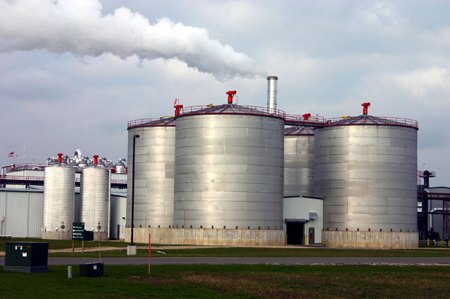South American Ethanol Debate Highlights Alt Fuel Insanity
Yesterday, Venezuelan President Hugo Chavez did something unusual: backpedal. The South American Bush basher “clarified” his opposition to an agreement between the U.S. and Brazil to promote ethanol production. Chavez claimed he objected to the development of corn-based ethanol– not Brazilian sugar cane-based ethanol. Echoing last month’s interminable diatribe by Fidel Castro, Chavez condemned America’s energy policy, declaring that "taking corn away from people and the food chain to feed automobiles is a terrible thing."
According to Brazilian President Luiz Inacio Lula da Silva, it doesn’t matter which organic source you use for ethanol production. Speaking at a two-day South American energy summit, da Silva rejected any notion of a food–fuel conflict. "The problem of food in the world now is not [a] lack of production of food. It's a lack of income for people to buy food… No one is going to stop planting rice to plant biofuels."
Perhaps. But one thing is for sure: America’s newfound love for ethanol is creating some major political and economic side effects.
Here at home, U.S. farmers are planting corn like crazy. And why not? This year’s ethanol subsidies will easily eclipse the $6b Uncle Sam doled out in ‘06. This despite the fact that corn-based ethanol take a great deal of energy to produce– from petrochemical-based fertilizers and pesticides to processing plants hooked into their local electricity grid to gasoline powered tractors and delivery trucks. In fact, it takes a lot of old-fashioned energy to create ethanol, and millions upon millions of gallons of water.
In any case, the rapid increase in American ethanol production is having a worrying impact on America’s food supply. Even though the “ethanol boom” has swelled American cornfield acreage from 78 to 90 million acres, federal ethanol mandates are still driving up prices. With corn futurologists eyeing the six billion gallons of corn-based ethanol slated for production this year, the price of corn has risen dramatically.
The price of beef, pork, poultry, breakfast cereal, Coca-Cola and other corn-based products are set to rise accordingly. This situation is not about to get any better. In January, President Bush set a goal of 35 billion gallons of domestically-produced alternative fuels by 2017. While companies are spending billions to try to figure out how to produce fuel from cellulosic (plant) waste, corn is still king. If U.S. corn-based ethanol production doubles or triples, corn prices will skyrocket.
Or not. Ironically enough, at the same time that corn prices are rising, ethanol prices are declining. If the margins disappear, so will the “ethanol boom.” No wonder there’s already a federal tariff on imported sugar cane-based ethanol– which President da Silva is lobbying the Bush administration to abandon. Given the corn-growing states’ political influence in Washington, there’s not much chance of that happening anytime soon.
Nor is there likely to be any change in the policy allowing automakers to calculate their E85-compatible vehicles’ mileage based on an entirely theoretical fuel economy (you try and find an E85 pump). Just as federal ethanol mandates inflate corn prices and distort the market, the E85 loophole inflates automakers’ CAFE (Corporate Average Fuel Economy) numbers and violates the spirit of the law. Oh, and supports the sale of gas guzzlers, which increases our dependence on foreign oil. Oh, and a Stanford University study published today suggests that increased ethanol use would harm the ozone layer.
Meanwhile, American ethanol demand has diverted surplus (i.e. federally subsidized) corn from foreign export. The change is causing food price inflation as near as Mexico, and as far away as China and India. While you could argue that the U.S. doesn’t “owe” foreign countries a vast supply of cheap corn, the political fallout isn’t good. Castro’s theme– the Yankees care more about running their SUVs than feeding the poor– is no boon to U.S. foreign policy.
Ironically, America’s ethanol push is based on a desire to reduce U.S. dependence on foreign oil, to free the country from the necessity of undesirable political entanglements. American ethanol production could inadvertently alienate more of the world’s population than the war in Iraq.
In fact, the whole alternative fuels policy is full of such bizarre contradictions. Environmentalists who embraced biologically-derived ethanol as a “clean” alternative to carbon-based energy would do well to consider the enormous rainforest destruction caused by Brazil’s ethanol industry. The current rate of deforestation will have a more profound effect on greenhouse gasses than the planet’s vehicular emissions.
The contradictions inherent in America’s ethanol production highlight the need for a comprehensive U.S. energy policy. If the U.S. is going to find a way to manage the political, environmental and economic implications of our energy production, delivery and consumption, we need to take a rational and independent look at ALL the alternatives– from Alaskan drilling to nuclear power to corn-based ethanol production. Otherwise, greed and hypocrisy will stymie any effort– however noble– to create any genuine change.
More by Robert Farago
Latest Car Reviews
Read moreLatest Product Reviews
Read moreRecent Comments
- El scotto They should be supping with a very, very long spoon.
- El scotto [list=1][*]Please make an EV that's not butt-ugly. Not Jaguar gorgeous but Buick handsome will do.[/*][*] For all the golf cart dudes: A Tesla S in Plaid mode will be the fastest ride you'll ever take.[/*][*]We have actual EV owners posting on here. Just calmly stated facts and real world experience. This always seems to bring out those who would argue math.[/*][/list=1]For some people an EV will never do, too far out in the country, taking trips where an EV will need recharged, etc. If you own a home and can charge overnight an EV makes perfect sense. You're refueling while you're sleeping.My condo association is allowing owners to install chargers. You have to pay all of the owners of the parking spaces the new electric service will cross. Suggested fee is 100$ and the one getting a charger pays all the legal and filing fees. I held out for a bottle of 30 year old single malt.Perhaps high end apartments will feature reserved parking spaces with chargers in the future. Until then non home owners are relying on public charge and one of my neighbors is in IT and he charges at work. It's call a perk.I don't see company owned delivery vehicles that are EV's. The USPS and the smiley boxes should be the 1st to do this. Nor are any of our mega car dealerships doing this and but of course advertising this fact.I think a great many of the EV haters haven't came to the self-actualization that no one really cares what you drive. I can respect and appreciate what you drive but if I was pushed to answer, no I really don't care what you drive. Before everyone goes into umbrage over my last sentence, I still like cars. Especially yours.I have heated tiles in my bathroom and my kitchen. The two places you're most likely to be barefoot. An EV may fall into to the one less thing to mess with for many people.Macallan for those who were wondering.
- EBFlex The way things look in the next 5-10 years no. There are no breakthroughs in battery technology coming, the charging infrastructure is essentially nonexistent, and the price of entry is still way too high.As soon as an EV can meet the bar set by ICE in range, refueling times, and price it will take off.
- Jalop1991 Way to bury the lead. "Toyota to offer two EVs in the states"!
- Jalop1991 I'm sorry, Dave. I'm afraid I can't do that.


































Comments
Join the conversation
Government Energy Policy = Thermodynamics via majority vote = destruction and death. Anyone disagree?
The truth is simple: the farming lobby is behind the push for ethanol, but no rational, scientific or economic argument can be found in favor of it. Detroit likes it though, because it diverts attention from promoting small, fuel efficient cars.